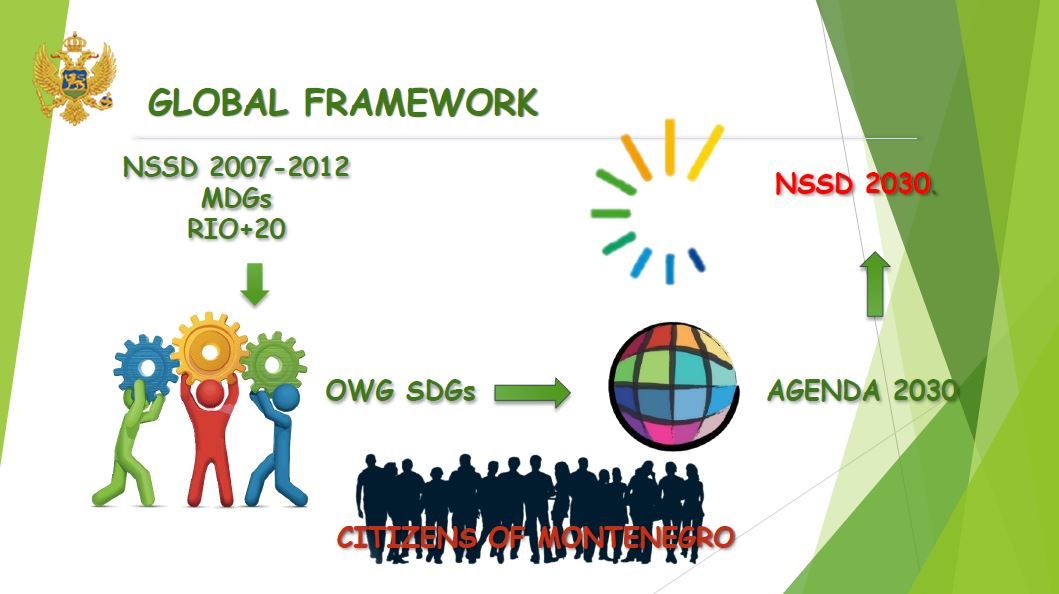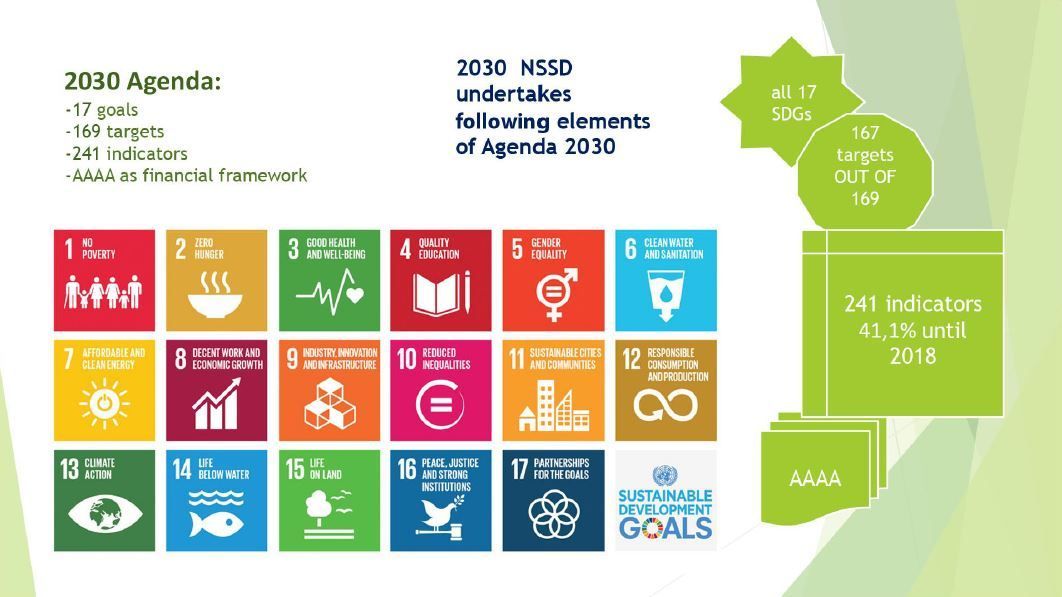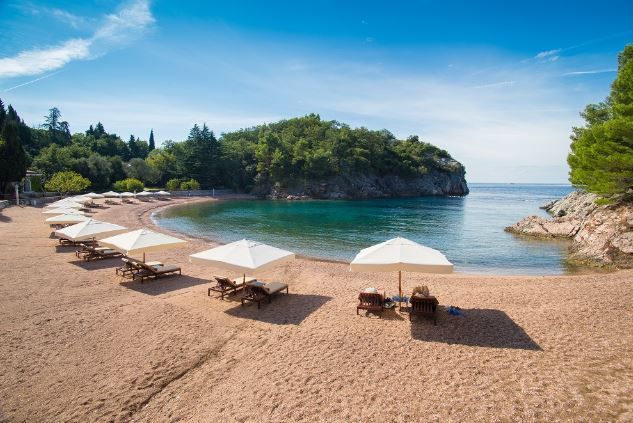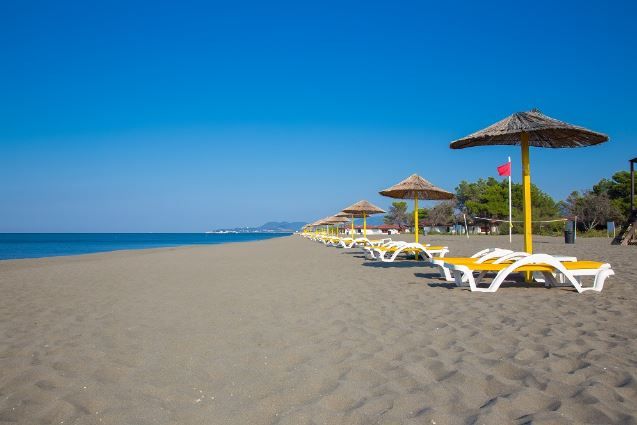Displaying items by tag: montenegro
12 June 2019 - The fight against organized crime, terrorism and illegal migration was the main topic of the bilateral meeting in Ljubljana between the Minister of the Interior Mevludin Nuhodžić and his counterpart from Slovenia Boštjan Poklukar.
The two officials agreed that Montenegro and Slovenia are two friendly countries, and that cooperation between the two ministries of the interior is traditionally good. On this occasion, Minister Nuhodžić was grateful for Slovenia's support to Montenegro in fulfilling two of the most important foreign policy goals – membership in NATO, which Montenegro has already achieved, and membership in the European Union.
As the Ministry of Interior of Montenegro reported, Minister Nuhodžić assessed that the cooperation between the two police organizations had yielded good results. Furthermore, he emphasised the importance of further strengthening the cooperation between the two departments to provide a high-quality response to common security challenges, but also to prevent all forms of crime.
Minister of the Interior of Slovenia Poklukar confirmed Slovenia's strong support to the European integration of Montenegro, and in that sense announced the continuation of cooperation and assistance through new joint projects.
Speaking on organized crime and terrorism, Minister Poklukar pointed out that the Montenegrin security authorities are a strong partner of the Slovenian police. In this regard, the ministers agreed that successful response to security challenges requires close cooperation and continuous exchange of information between the police of the two countries, and agreed to intensify cooperation in this regard.
Speaking on the topic of illegal migration and the situation in that area from a regional perspective, the ministers agreed that migrations are not a matter of a single state. In that regard, they noted the importance of continuous and open communication of the police in the region and further strengthening of cooperation.
Read more about politics in Montenegro at TMN's dedicated page.
12 June 2019 - In the four months of this year, banks have granted loans in the amount of 2,95 billion EUR in total. It represents a 2,7% decline at a monthly level, indicates the data of the Central Bank of Montenegro, as reported by Cafe del Montenegro.
The amount of the granted loans is 4,3% higher in comparison to the first four months of last year. As far as the deposits are concerned, they declined by 3,2% in April in comparison to March and amounted to 3,32 billion EUR. At an annual level, deposits increased by 1%.
“There has been a decline in deposits at the monthly level since Atlas bank has been excluded from the records,” explained the representatives of the Central Bank of Montenegro.
If deposits of Atlas Bank are left out from the total deposits in April, the savings increase at banking system level amounts 7,6% annually.
“Time deposits make up 32,3% of the total, whereas demand deposits made up 67,6%,” stated the Report generated by the Central Bank of Montenegro.
In mid-May, the Central Bank of Montenegro reported that thirteen banks that operate in Montenegro (apart from Atlas and IBM that went bankrupt) were in the plus 14,3 million EUR at the end of the first quarter. Every bank has made a profit except for Nova and Zirat. Universal Capital Bank had the biggest increase in profit. In comparison to the same period last year, its profit has increased by 13 times.
Banks have earned a total of 33,4 million EUR based on interests and 8,3 million EUR based on fees and commissions. Erste Bank has made the highest profit in three months – 2,4 million EUR. It has earned 5,5 million EUR based on interests and 579.000 EUR based on fees and commissions.
Read more about Business in Montenegro at TMN's dedicated page.
11 June 2019 - The greatest achievements in the area of robotics and 3D technology have been presented at this year’s International trade fair of technique and technical achievements in Belgrade, said the engineer in Montenegrin Electricity Distribution System, Mrs Margita Miljanić.
This is the 63rd fair and it featured tools used in everyday activities. Visitors were mostly interested in the presentation of the application of drones in different technological spheres.
“The fair is the place where achievements and innovation in different technical and technological areas are being showcased. The organization was a major success and Russians and Chinese were dominant among foreign exhibitors. There were achievements in the area of robotics, automatics, machines, tools, different software, 3D and laser technology,” said Mrs Miljanić.
Mr Boris Femić, an engineer, points out that trade is the place for the promotion of revolutionary changes in the ways of operation in companies and industries.
“Conception emphasis of the trade fair was put on the innovation and new technologies which are permeated into a great number of professional areas. Such events are educational, interesting and useful, as a great number of foreign and domestic exhibitors take part,” said Mr Femić.
This experience in Belgrade was important for the engineers of the Montenegrin Electricity Distribution system, as they were able to find expert literature in free sale.
“We could find literature we are interested in, all in one place. This trade fair was marked with robotics this year and that’s the area which is being developed at great speed and is applied in different life spheres,” said Mr Vladimir Ivanović, a visitor.
Montenegrin Electricity Distribution System delegation had the opportunity to see more than 100 novelties at the trade fair.
“New products of Loznica Electro and Rade Končar factory have been presented. There were many exhibitors of machinery and robotics, said the member of the delegation,” Mr Marko Mugoša.
Loznica Electro company presented the most contemporary achievements in the domain of one-way voltage and AKU battery, as well as the product of voltage cells for the internal assembly.
Mr Ivan Mumin, an engineer from Belgrade attended the trade fair for the first time and was very happy.
“I am very satisfied with the exhibitors, they were so kind and willing to answer our questions. We could see how the production processed have become so simple with the development of new technologies and how sophisticated modern technologies are,” said Mr Mumin.
Mr Marko Mugoša says that after the exhibitions, they visited Belgrade sites.
“In three days, we managed to see the cultural and historical heritage of Belgrade. Such reunions should become a tradition,” says Mr Mugoša.
Source: Cafe del Montenegro
11 June 2019 - This summer, tourists will have 139 beaches and bathing areas in Budva at their disposal of which 22 are hotel bathing areas, 88 intended as family bathing areas, 4 romantic, one party area, 8 excursion areas, 2 pet-friendly bathing areas and one location intended for dogs only.
There are also nine beaches with no equipment, two beaches for active rest, two nudist beaches and one beach as a children's resort.
Romantic areas in Budva are located on the Island of Saint Nikola, Malaya Beach, Reževići and Bršalj in Petrovac.
The party bathing area is located in Kamenovo, where the noise doesn’t affect the surrounding areas.
There are two excursion areas on the island of Saint Nikola, at Jaz beach, in Golubinj, Drobni Pijesak, Veizorovo ribarište and Crvena Stijena (Red Rock). They are accessible from the water only and are suitable for excursions and picnics.
The bathing areas for pets are Buljarica and Slovenska plaža, and there is also an area for dog-bathing, which is not designated as a bathing area.
Bathing areas without beach equipment are Saint Nikola, Slovenska plaža neat Park hotel, Bečići, Pržno on its east, Saint Stephen and part of the beach in Petrovac.
Two diving areas at the Jaz beach and Slovenska plaža are the areas for active rest.
Nudist beaches are Jaz – Žuta greda and Crvena Glavica, while the children resort is located in Bečići.
Source: Cafe del Montenegro
11 June 2019 - The first results of the analysis of seawater quality for 100 public swimming areas, conducted by the Institute of Biology for the needs of Public Enterprise for Coastal Zone Management of Montenegro from May 23rd to May 26th, showed that on 89% of the beaches the quality of seawater was K1 class, while on 11% of the swimming areas the water was K2 class.
These results confirm that the seawater at Montenegrin beaches is of excellent quality, i.e., that the beaches have good sanitary conditions and that the water is safe for swimming and recreation.
Out of 16 swimming areas in Ulcinj Municipality, 13 had water with excellent quality, while 3 beaches had water with class K2, or satisfactory quality.
In Bar, the quality of seawater was K1 class on all 12 swimming areas, while in the municipality of Budva the analysis was done in 27 locations, one of which was recorded quality K2, while in other locations the sea water had K1 class quality.
The quality of seawater K1 was determined at 6 swimming areas in Tivat, while 3 of Tivat’s beaches had the quality class K2.
In Kotor, out of a total of 15 bathing areas, the quality K1 was determined at 12 locations, while for the remaining 3 the quality of the water was K2 class.
When it comes to water quality on the Herceg Novi coast, the analyses showed the sea water quality K1 class at a total of 20 swimming areas, while one beach had water with quality rating class K2.
The results of testing the sanitary quality of seawater, as well as the data on sea temperature, air temperature and salinity for each individual bathing site, can be found on the special application on the website www.morskodobro.com.
Since 1996, the Public Enterprise for Coastal Zone Management of Montenegro has been implementing annual programs for monitoring the sanitary quality of seawater at public beaches during the summer season in accordance with the provisions of the Water Act. Since 2010, this Program has been implemented by the Decree on classification and categorization of waters, as well as following other national and international regulations in the field of environmental protection.
In order to monitor the sanitary safety of seawater in public swimming areas and its overall quality, and in accordance with national and international regulations, the following parameters are examined: basic microbiological parameters - escherichia coli, intestinal enterococci, as well as additional chemical parameters: air temperature, water temperature (when taking a sample), salinity, pH value, the colour saturation with oxygen (% O2), ammonia (mg / l), floating waste materials (descriptive) and colour and transparency (descriptive).
Read more about Montenegro's coast at TMN's dedicated page.
10 June 2019 - By joining the European Union, Montenegro wants to be in the company of allied European countries that cherish and protect human dignity as their highest value, Deputy Prime Minister Zoran Pažin said for the Government of Montenegro at the opening of the plenary session of the Club of Venice in Bar.
"This value is exactly on what modern Montenegro was built and why we see our membership in the European Union as a natural continuation of the historical process of affirmation and preservation of the civil and European identity of our country," the Deputy Prime Minister said.
He stressed that current and future members of the European Union must be aware of the shared responsibility for the success of the United Europe project.
"We have no ambition to join the European Union before we are fully prepared to fulfill all our obligations and enjoy the full benefits of fully-fledged membership. However, we must all be aware that we share a common destiny as Europeans. That the future of European countries, the competitiveness of our economies and our way of life depend to a large extent on the success of a European project, for which we have a common responsibility," DPM Pažin emphasised.
By this occasion, he also estimated that it is very important for citizens to understand the significance of this historic mission of the European Union, as well as to understand the alleged alternatives to the European democratic values, which are offered to them.
"Advocating the accession of new members to the European Union based on merit is, in fact, the affirmation of a key EU mission – the spread of peace and prosperity across the European continent. On the other hand, greater support from the European public for admitting new members to the EU will strengthen the Union's internal cohesion and significantly strengthen the credibility and substance of its basic principle – united in diversity," Deputy Prime Minister Pažin highlighted.
He pointed out that today the EU's generations born and raised in the period of peace and prosperity, unprecedented in the history of the old continent, challenge the very purpose and key values of a united Europe, and reminded that, also in Europe, there are generations who, not so long ago, grew up in significantly different and unfavourable circumstances, in which some of the basic human needs were considered luxury.
Furthermore, the Deputy Prime Minister stated that this could be part of the reason why people in the southwest of Europe generally support the European Union more. He added, however, that the support that the European Union enjoys in the region of Southeast Europe is not only a matter of ideals, values or a common identity, but also a very specific progress in improving the quality of life and the standard of living.
"Take Montenegro as an example. Since we, as an independent state, began our path to the European Union in 2006, the average salaries and pensions in Montenegro have doubled. Today, our citizens travel freely throughout Europe, our students, lecturers and scientists participate in numerous study and research programmes, while our farmers receive significant expert and financial support from European funds," DPM Pažin said.
The Club of Venice is a European professional network that gathers senior public communications professionals from EU member states and institutions, and more recently the candidate country for EU membership. Montenegro is the first country outside the European Union to host the plenary session of the Club of Venice in 33 years of the existence of this prestigious European forum.
The plenary session of the Club of Venice in Montenegro discusses the issues of communication strategies for engaging citizens in European politics, experiences from recently held European elections, combating misinformation, communication of enlargement policy and development of communication capacities and practices of European institutions, member states and candidate countries. This is the first event of this kind that gathered government officials from EU member states and institutions after the European Parliament elections.
Read more about politics in Montenegro at TMN's dedicated page.
11 June 2019 - The Regional Cooperation Council (RCC), under its Tourism Development and Promotion EU funded project, launched the second consecutive grant call for projects developing the tourism offer in the Western Balkans on June 10. As stated in their 2nd Call for Proposals, while the grants scheme totals EUR 1.62 million, this second tranche is making available EUR 750,000 for the implementation of some 14 pilot projects worth up to EUR 54,000.
The goal of the RCC's grant scheme is to develop and globally promote the joint regional cultural and adventure tourism offer, bring more visitors to the Western Balkans, lengthen their stay and increase revenues and employment in the tourism industry. Therefore, the grants to be implemented under the 2nd Call for Proposals will be geared towards the improvement of tourism infrastructure and services along three new regional cultural tourism routes now under development: Western Balkans – Crossroads of Civilisations; Illyricum Trail and Balkan Monumental Trail, and along Via and Trans Dinarica, regional hiking and biking routes and their auxiliary adventure tourism attractions.
“The region is stronger together. This is as true for tourism as is for any other fields. The difference is that tourism has an advantage of growing faster than other industries – it already accounts for 14% of employment in the Western Balkans. More than 12 million tourists entered the region last year. This is why we are intensively working on the development of a joint regional tourism offer and further supplementing efforts of the governments specifically in the cultural and adventure tourism niches,” said Majlinda Bregu, RCC Secretary General.
“Our goals are simple. We want to create a more attractive tourism offer which will attract more tourists to the region and lead to bigger profits and more people being employed in tourism. While our Tourism Development and Promotion Project works on the big picture, the grant scheme is making it possible for local level governments, NGOs and development agencies to get involved in tourism and contribute to the development of a joint regional offer by implementing actions that will improve the quality of services and tourism infrastructure at the local level,” stated Secretary General Bregu.
To provide sufficient information about the 2nd Call for Proposals to all interested parties, between 12 and 20 June 2019 the RCC will organize a series of Info Days covering all six Western Balkans Economies.
This is the 2nd Call for Proposals under the RCC’s tourism grants scheme.
The 1st Call for Proposals implemented between July 2018 and June 2019 resulted in the implementation of twelve grants in a total value of EUR 548,000 which led to the creation of preconditions for development of seven new cultural routes in the region, as well as the implementation of actions that upgraded the quality of the adventure tourism offer, specifically along Via Dinarica trail and in equestrian tourism.
The 3rd call for proposal is expected to be launched in September 2019.
Read more about tourism in Montenegro at TMN's dedicated page.
10 June 2019 - The first noise pollution sound limiter in Montenegro was installed in Herceg Novi, more precisely in the Pub Got. Sound limiting devices are new in the Montenegrin market, but judging from the experience of other tourist countries, they are important element in regulating and respecting regulations regarding sound pollution is necessary, as reported by Radio Jadran.
Head of the Public Utility Police and Inspection Supervision Marija Andrić pointed out that these activities aim at improving the quality of life in the city. Same as in the previous years, the Public Utility Police will constantly monitor the process, and at the same time measure the noise level arising from the catering facilities in the evening hours. In order to enforce the laws of noise protection, the municipal inspector and the Public Utility police officer are obliged to continuously monitor and control the execution of the measures and actions they have ordered, and they will continuously monitor the fulfillment of the conditions of technical correctness and functionality of the installed noise pollution sound limiter.
She also noted that the Law on Tourism and Catering brought novelties aimed at preventing the exceeding of the allowed noise level. Thus, every catering facility in which the music programme is being performed, with the use of electro-acoustic and acoustic devices, will be obliged to install a volume limiter on the device from which the music is being broadcasted.
Andrić noted that in order to obtain a Music Programme Approval, with the request as an attachment, it is necessary to submit a Certificate of Installed Limiters.
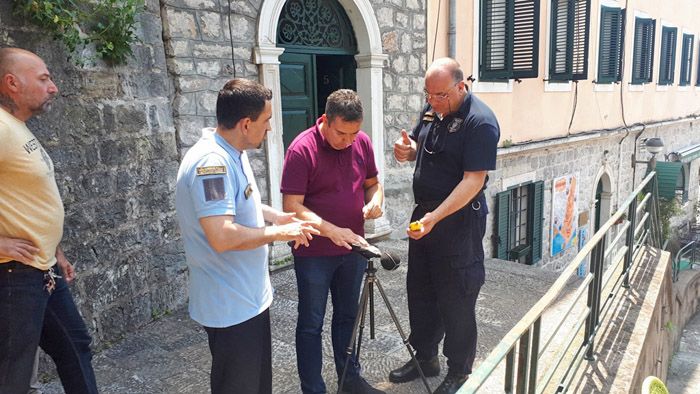
As the expert for noise measurement in the environment of the Institute "Sigurnost" Boško Perović explained, as of May 1 this year, the Rulebook on noise limit values in the environment and on the sound limiters is in force.
"By regulating this, conditions for solving noise problems have been created, which are particularly pronounced in coastal municipalities. Now, we can solve these problems and challenge and deal with them as much as possible. There are also positive by-laws that regulate the permissible noise level, this time both inside and outside," Perović said, adding that the external sound, or sound outside the building, should not exceed 65 decibels, in accordance with the Law on Noise Protection. According to the rules on protection at work, the limit for the inside of coffee bars is 75 decibels.
It clarifies that by installing the sound level limiter, functionality is ensured - if the level of sound is exceeded, the device will return the sound level to the level at which the device is calibrated.
"This means there will be no abolition of music and electricity. I consider this the best solution, the catering facility will be able to continue working normally, that is, under the conditions that the limiter allows," concluded Perović.
The sound limitation is performed on the basis of the measurement of an accredited noise measurement institution, which makes a report on the fulfillment of conditions for setting the limiter. The authorized service provider-importer of the limiter mounts the device on the basis of field measurements, and the Public Utility and Inspection Service put its official stamp on the limiter, which must not be physically damaged at any time during its work.
Herceg Novi is the first city in Montenegro to start this practice, and in the coming days will also do some catering facilities in Nikšić and Bar.
Read more about lifestyle news in Montenegro at TMN's dedicated page.
11 June 2019 - The Ministry of Sustainable Development and Tourism of Montenegro recently stated that the goals of the state related to sustainable development - regionally balanced and sustainable economic development, full employment and decent work for all, should be fulfilled by 2030.
"Our sincere intention is to achieve the vision of sustainable development of Montenegro by 2030, which means that we should achieve regionally balanced and sustainable economic development, full employment and decent work for all," Minister Pavle Radulović said at the opening of the 18th Session of the Mediterranean Commission for the Sustainable development.
Within the framework of the two-year presidency of the Mediterranean Commission for Sustainable Development, Montenegro is the host of the session which is held from 11 to 13 June 2019.
The 18th Session of the Mediterranean Commission for Sustainable development is hosted at the Maestral Hotel in Budva.
During his presentation, Radulović reminded the participants that by adopting the 2030 National Sustainable Development Strategy, Montenegro became one of the first countries in the world that fully accepted and integrated the requirements of the United Nations Agenda for Sustainable Development into the national system. The goal of this strategy is to build a society based on continuous, inclusive and sustainable economic growth, protecting natural resources and strengthening social inclusion. Radulović also pointed out that with this strategy, Montenegro shows that its method for achieving sustainable development of its society is, in fact, having an objective and critical point of view in regards to current issues and finding appropriate solutions to these issues.
Minister Radulović highlighted that it is of great importance to launch initiatives that should concretize practical approaches and actions in order to implement the activities of the Mediterranean Action Plan and the Mediterranean Commission in the upcoming period. Also, he pointed out that an important measure for sustainable development is the creation of optimal practical models for applying the principles of integrated coastal management, in synergy with the application of the ecosystem approach in the planning of the purpose of marine areas.
Mediterranean Commission acts as an advisory body to the Contracting Parties of the Barcelona Convention, and its members, participating on equal footing, include representatives of the Member States and the European Commission, as well as Civil Society representatives from the region’s local authorities, economic partners (chambers of commerce, etc.), environmental NGOs, etc. It is basically a think tank on policies for promoting sustainable development in the Mediterranean Basin and focuses on key issues in its drive for tangible outcomes.
Read more about Politics in Montenegro on TMN's dedicated page.
10 June 2019 - The Director of the Public Enterprise for Coastal Zone Management of Montenegro, Predrag Jelušić, presented a total of 29 Blue Flags to various swimming areas (beaches) and one to Marina Bar, which is the only marina in Montenegro that has this prestigious ecological feature, reports National Tourism Organization of Montenegro.
The iconic Blue Flag is one of the world’s most recognised voluntary eco-labels awarded to beaches, marinas, and sustainable boating tourism operators. In order to qualify for the Blue Flag, a series of stringent environmental, educational, safety, and accessibility criteria must be met and maintained.
The Blue Flag program has been implemented in Montenegro since 2003 when NGO "EKOM" became an associate member of the Foundation for Environmental Education and thus acquired the right to be the National Operator for Montenegro. PE for Coastal Zone Management immediately recognized the importance of the Blue Flag and from the very beginning became the general sponsor and supporter of the Program, which is one of the most important activities related to the responsible management of the coast and beaches.
The Blue Flag is awarded for the current season based on the results from the previous season, which are assessed by the National Commission consisting of the representatives of the relevant Ministry of Sustainable Development and Tourism, the Public Enterprise for Coastal Zone Management, the Red Cross of Montenegro, the Port Management, and the environmental NGOs. At the beginning of each year, they review the statements and reports of beach tenants and analyse the fulfilment of 32 criteria in the area of safety and services on beaches, quality of seawater and environmental activities, regardless of the number of years spent in the Program.
Based on the proposal of the National Commission, each year the international jury awards certain swimming areas (beaches) with the Blue Flag. The jury gathers and makes the decisions in Copenhagen each year at the end of May. Members of the international jury are representatives of renowned institutions such as the World Tourism Organization (WTO), the Foundation for Environmental Education (FEE), the International Rescue Organization (IRC), the UN Environment Program, The International Council of Marine Industry Associations (ICOMIA) and others.
Blue Flag Awarding is based on meeting the criteria in four basic areas: ecological education and information, water quality, ecological management and safety and service. For beaches, from 2017, it is necessary to comply with 33 criteria, out of which 28 are imperative and 5 are recommended. Some of the necessary criteria are: ecological and educational activities, highlighted map of the beach with marked different contents, compliance with requirements and standards regarding frequency of sampling of sea water, fulfilling requirements and standards in terms of microbiological, physical and chemical parameters of sea water, sanitary facilities with controlled drainage, emergency response plans etc.
Read more about exploring Montenegro at TMN's dedicated page.

